Romanian-born actress Nadia Gray (1923-1994) was an elegant and seductive star of European films of the 1950s and 1960s. She is best known for her striptease scene in Fellini’s classic La Dolce Vita (1960).
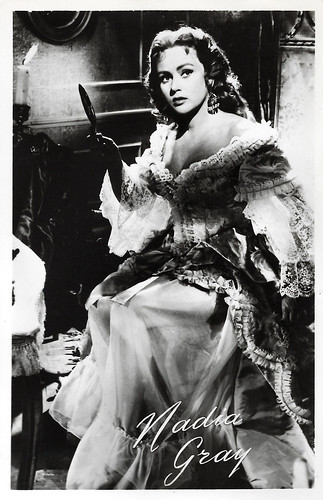
Dutch postcard by Takken, Utrecht, no. 1684. Photo: Nadia Gray in Le avventure di Giacomo Casanova/The Loves of Casanova (Steno, 1955).
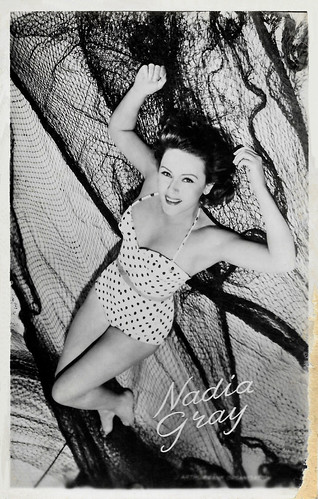
Dutch postcard. Photo: J. Arthur Rank Organisation.
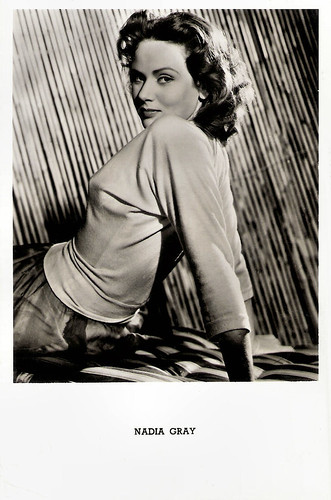
Belgian postcard, no. 271.
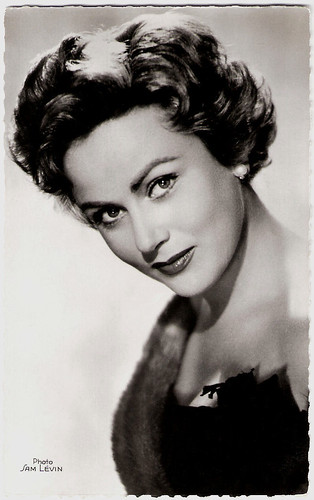
French postcard by Editions du Globe, Paris, no. 346. Photo: Sam Lévin.
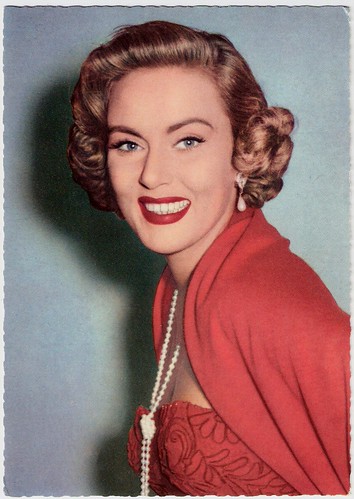
German postcard by ISV, no. M 13. Photo: Europa-Film / Haenchen.
Nadia Gray (sometimes Nadja Grey) was born Nadia Kujnir-Herescu in Bucharest, Romania in 1923. She came from an old Jewish family. Her father was a Russian refugee and her mother was Bessarabian. As a child, she was such an admirer of King Carol of Romania that she threw down a bunch of flowers from her balcony on the royal cortege passing by. It was a time of anarchist terror and the incident caused her family some trouble.
In 1946, she married the aristocrat Constantin Cantacuzino, a Romanian aviator and WW II fighter ace. They had met when she was a passenger on a commercial air flight at which he was the pilot. One of the engines had caught fire and Cantacuzino was forced to do an emergency landing.
At the time, Gray had just started a career as a theatre actress. In 1947, the couple left Romania for Paris to escape the Communist regime after World War II. Her film debut was in the French-Austrian coproduction L'Inconnu d'un soir/Strangers on a night (Hervé Bromberger, 1948) with Claude Dauphin. She played the leading role as a young waitress who yearns to be a star.
Nadia enjoyed with her husband a cosmopolitan jet-set life and meanwhile, she appeared on stage and in films. Early film roles that led to European stardom included her countess in Monseigneur/Monsignor (Roger Richebe, 1949) opposite Bernard Blier, a woman in love with a master-safecracker (Guy Rolfe) in The Spider and the Fly (Robert Hamer, 1949), and an opera diva in the Technicolor biopic Puccini (Carmine Gallone, 1953) featuring Gabriele Ferzetti as the composer.
Her English language films included the action-adventure Valley of Eagles (Terence Young, 1951), the crime drama Night Without Stars (Anthony Pelissier, 1951) opposite David Farrar, and the comedy The Captain's Table (Jack Lee, 1959). Gray and her husband had eventually settled in Spain, but in 1958 Cantacuzino died.
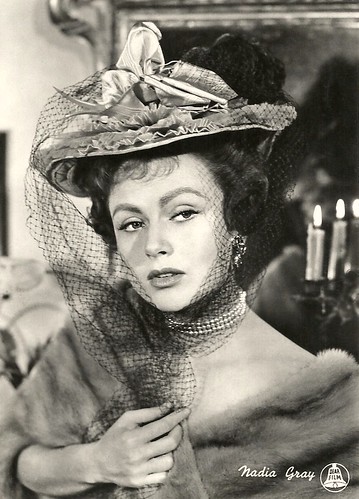
Italian postcard by Bromofoto, Milano. Photo: Dear Film.
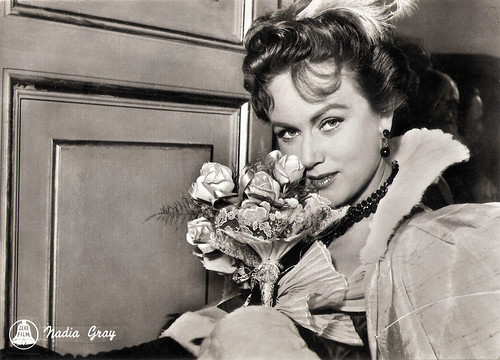
Italian postcard by Bromofoto, Milano, no. 467. Photo: Dear Film.

Italian postcard by Bromofoto, Milano, no. 135. Photo: Dear Film. Publicity still for Puccini (Carmine Gallone, 1953).
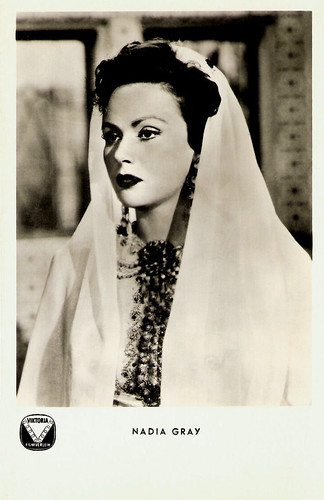
German postcard by Kunst und Bild, Berlin, no. V 301. Photo: Viktoria Filmverleih. Nadia Gray in Ivan (il figlio del diavolo bianco)/Ivan, Son of the White Devil (Guido Brignone, 1953).
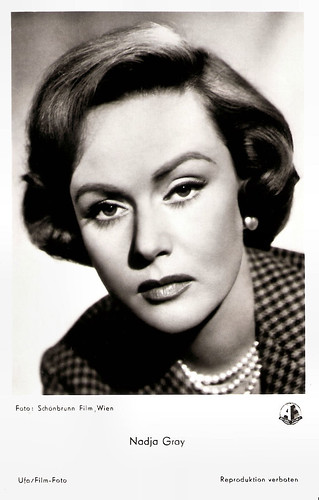
West-German postcard by Ufa/Film-Foto, no. 271. Photo: Schönbrunn-Film, Wien / Allianz Film. Nadia Gray in Hengst Maestoso Austria/Stallion Maestoso Austria (Hermann Kugelstadt, 1956).
Nadia Gray’s best-known role is as the bored and decadent socialite Nadia in La Dolce Vita (Federico Fellini, 1960) starring Marcello Mastroianni. In fact, her part is only a cameo: toward the end of Fellini's masterpiece, Nadia celebrates her divorce by performing a sensual mink-coated striptease during a wild party at her home.
Gray specialised in aristocratic, jet-set roles. Among her scattered appearances in English-speaking productions were the comedy Mr. Topaze (Peter Sellers, 1961) starring Peter Sellers, the Hammer horror-thriller Maniac (Michael Carreras, 1963) co-starring Kerwin Mathews, the thriller The Naked Runner (Sidney J. Furie, 1967) starring Frank Sinatra, and a supporting role in the classic romance Two for the Road (Stanley Donen, 1967) with Albert Finney and Audrey Hepburn.
On TV, Gray played a.o. Number 8 in The Chimes of Big Ben (1967), an episode of the cult series The Prisoner (1967-1968) starring Patrick McGoohan.
She had acquired the French nationality in 1964, but in 1967 she married Manhattan attorney Herbert Silverman, and they settled in the USA. She retired from films completely in 1976 and began headlining as a nightclub singer.
Nadia Gray died of a stroke in 1994 in New York City. She was 70 and was survived by her second husband and their two stepchildren.
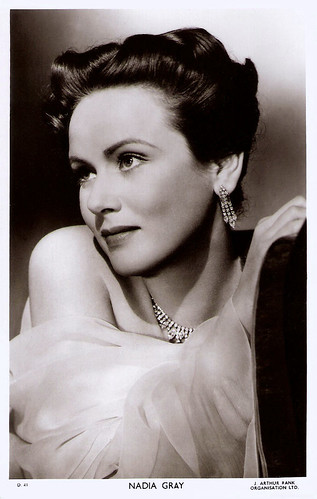
British postcard in the Picturegoer Series, London, no. D 41. Photo: J. Arthur Rank Organisation Ltd.
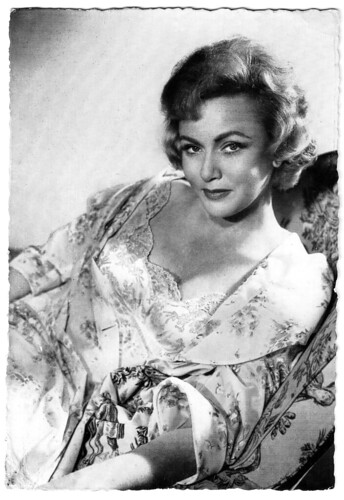
German postcard by WS-Druck, Wanne-Eickel, no. 302. Photo: Bavaria / Cosmopol / Schorcht. Nadia Gray in Meine schöne Mama/My Pretty Mama (Paul Martin, 1958).
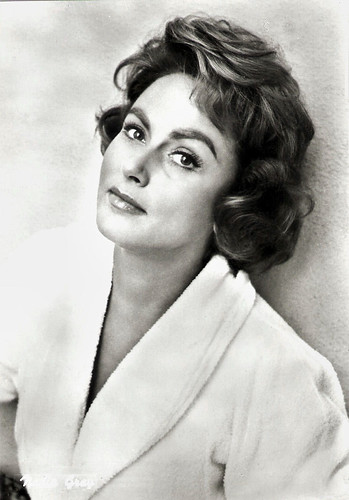
Italian postcard by Bromofoto, Milano, no. 1673. Photo: Rank. Nadia Gray in The Captain's Table (Jack Lee, 1959).

Vintage card. Photo: J. Arthur Rank Organisation Ltd.
A long scene from La Dolce Vita (1960) including the famous striptease (No subtitles - partly in English). Source: Umbgu (YouTube).
Sources: Gary Brumburgh (IMDb), Hal Erickson (AllMovie - page now defunct), Thomas Staedeli (Cyranos), Wikipedia (French, Italian, German and English) and IMDb.
This post was last updated on 10 July 2024.

Dutch postcard by Takken, Utrecht, no. 1684. Photo: Nadia Gray in Le avventure di Giacomo Casanova/The Loves of Casanova (Steno, 1955).

Dutch postcard. Photo: J. Arthur Rank Organisation.

Belgian postcard, no. 271.

French postcard by Editions du Globe, Paris, no. 346. Photo: Sam Lévin.

German postcard by ISV, no. M 13. Photo: Europa-Film / Haenchen.
Anarchist incident
Nadia Gray (sometimes Nadja Grey) was born Nadia Kujnir-Herescu in Bucharest, Romania in 1923. She came from an old Jewish family. Her father was a Russian refugee and her mother was Bessarabian. As a child, she was such an admirer of King Carol of Romania that she threw down a bunch of flowers from her balcony on the royal cortege passing by. It was a time of anarchist terror and the incident caused her family some trouble.
In 1946, she married the aristocrat Constantin Cantacuzino, a Romanian aviator and WW II fighter ace. They had met when she was a passenger on a commercial air flight at which he was the pilot. One of the engines had caught fire and Cantacuzino was forced to do an emergency landing.
At the time, Gray had just started a career as a theatre actress. In 1947, the couple left Romania for Paris to escape the Communist regime after World War II. Her film debut was in the French-Austrian coproduction L'Inconnu d'un soir/Strangers on a night (Hervé Bromberger, 1948) with Claude Dauphin. She played the leading role as a young waitress who yearns to be a star.
Nadia enjoyed with her husband a cosmopolitan jet-set life and meanwhile, she appeared on stage and in films. Early film roles that led to European stardom included her countess in Monseigneur/Monsignor (Roger Richebe, 1949) opposite Bernard Blier, a woman in love with a master-safecracker (Guy Rolfe) in The Spider and the Fly (Robert Hamer, 1949), and an opera diva in the Technicolor biopic Puccini (Carmine Gallone, 1953) featuring Gabriele Ferzetti as the composer.
Her English language films included the action-adventure Valley of Eagles (Terence Young, 1951), the crime drama Night Without Stars (Anthony Pelissier, 1951) opposite David Farrar, and the comedy The Captain's Table (Jack Lee, 1959). Gray and her husband had eventually settled in Spain, but in 1958 Cantacuzino died.

Italian postcard by Bromofoto, Milano. Photo: Dear Film.

Italian postcard by Bromofoto, Milano, no. 467. Photo: Dear Film.

Italian postcard by Bromofoto, Milano, no. 135. Photo: Dear Film. Publicity still for Puccini (Carmine Gallone, 1953).

German postcard by Kunst und Bild, Berlin, no. V 301. Photo: Viktoria Filmverleih. Nadia Gray in Ivan (il figlio del diavolo bianco)/Ivan, Son of the White Devil (Guido Brignone, 1953).

West-German postcard by Ufa/Film-Foto, no. 271. Photo: Schönbrunn-Film, Wien / Allianz Film. Nadia Gray in Hengst Maestoso Austria/Stallion Maestoso Austria (Hermann Kugelstadt, 1956).
Bored and decadent socialite
Nadia Gray’s best-known role is as the bored and decadent socialite Nadia in La Dolce Vita (Federico Fellini, 1960) starring Marcello Mastroianni. In fact, her part is only a cameo: toward the end of Fellini's masterpiece, Nadia celebrates her divorce by performing a sensual mink-coated striptease during a wild party at her home.
Gray specialised in aristocratic, jet-set roles. Among her scattered appearances in English-speaking productions were the comedy Mr. Topaze (Peter Sellers, 1961) starring Peter Sellers, the Hammer horror-thriller Maniac (Michael Carreras, 1963) co-starring Kerwin Mathews, the thriller The Naked Runner (Sidney J. Furie, 1967) starring Frank Sinatra, and a supporting role in the classic romance Two for the Road (Stanley Donen, 1967) with Albert Finney and Audrey Hepburn.
On TV, Gray played a.o. Number 8 in The Chimes of Big Ben (1967), an episode of the cult series The Prisoner (1967-1968) starring Patrick McGoohan.
She had acquired the French nationality in 1964, but in 1967 she married Manhattan attorney Herbert Silverman, and they settled in the USA. She retired from films completely in 1976 and began headlining as a nightclub singer.
Nadia Gray died of a stroke in 1994 in New York City. She was 70 and was survived by her second husband and their two stepchildren.

British postcard in the Picturegoer Series, London, no. D 41. Photo: J. Arthur Rank Organisation Ltd.

German postcard by WS-Druck, Wanne-Eickel, no. 302. Photo: Bavaria / Cosmopol / Schorcht. Nadia Gray in Meine schöne Mama/My Pretty Mama (Paul Martin, 1958).

Italian postcard by Bromofoto, Milano, no. 1673. Photo: Rank. Nadia Gray in The Captain's Table (Jack Lee, 1959).

Vintage card. Photo: J. Arthur Rank Organisation Ltd.
A long scene from La Dolce Vita (1960) including the famous striptease (No subtitles - partly in English). Source: Umbgu (YouTube).
Sources: Gary Brumburgh (IMDb), Hal Erickson (AllMovie - page now defunct), Thomas Staedeli (Cyranos), Wikipedia (French, Italian, German and English) and IMDb.
This post was last updated on 10 July 2024.
1 comment:
I remember her face from alot of movies and TV. Nice to know her background
Post a Comment